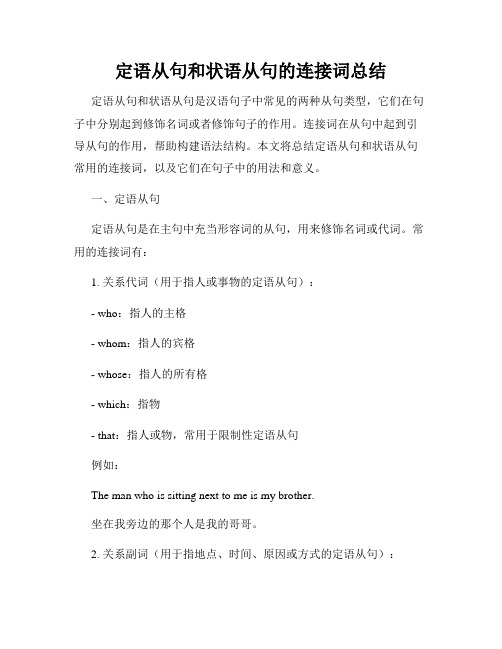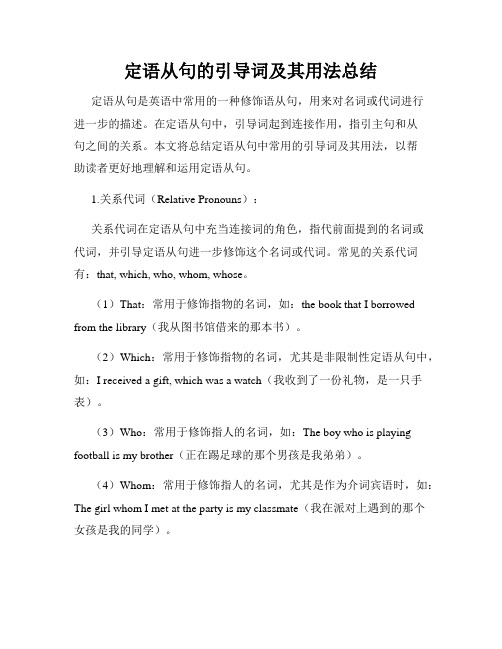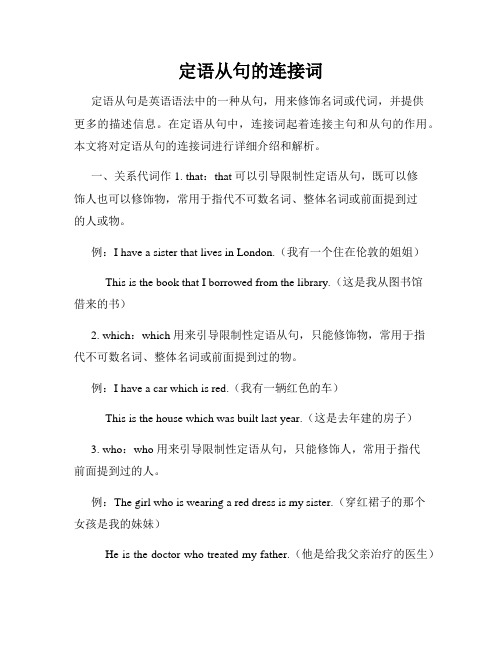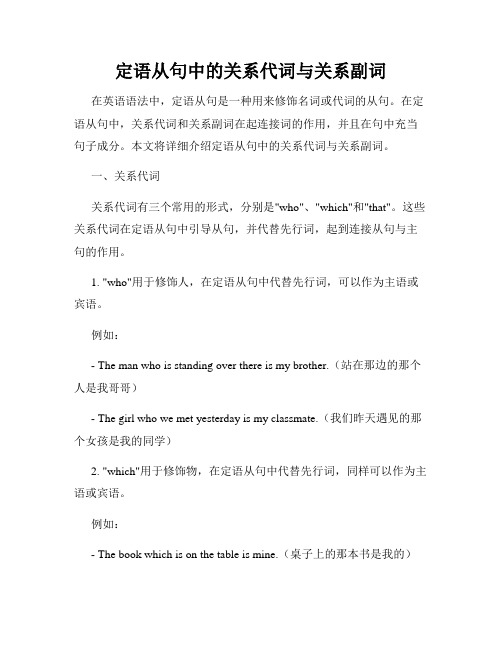定语从句的连接词
定语从句和状语从句的连接词总结

定语从句和状语从句的连接词总结定语从句和状语从句是汉语句子中常见的两种从句类型,它们在句子中分别起到修饰名词或者修饰句子的作用。
连接词在从句中起到引导从句的作用,帮助构建语法结构。
本文将总结定语从句和状语从句常用的连接词,以及它们在句子中的用法和意义。
一、定语从句定语从句是在主句中充当形容词的从句,用来修饰名词或代词。
常用的连接词有:1. 关系代词(用于指人或事物的定语从句):- who:指人的主格- whom:指人的宾格- whose:指人的所有格- which:指物- that:指人或物,常用于限制性定语从句例如:The man who is sitting next to me is my brother.坐在我旁边的那个人是我的哥哥。
2. 关系副词(用于指地点、时间、原因或方式的定语从句):- where:指地点- when:指时间- why:指原因- how:指方式例如:This is the city where I was born.这是我出生的城市。
二、状语从句状语从句用来修饰整个句子或主句的成分,并提供更多的信息。
常用的连接词有:1. 引导时间状语从句的连接词:- when:当…的时候- while:当…时候- as soon as:一…就- before:在…之前- after:在…之后- until:直到例如:I will call you when I arrive.我到达时会给你打电话。
2. 引导条件状语从句的连接词:- if:如果- unless:除非- provided that:只要例如:If it rains, we will stay at home.如果下雨,我们将呆在家里。
3. 引导原因状语从句的连接词:- because:因为- since:因为- as:因为- now that:既然例如:I didn't go to the party because I was busy.我没去参加聚会,因为我很忙。
定语从句的引导词及其用法总结

定语从句的引导词及其用法总结定语从句是英语中常用的一种修饰语从句,用来对名词或代词进行进一步的描述。
在定语从句中,引导词起到连接作用,指引主句和从句之间的关系。
本文将总结定语从句中常用的引导词及其用法,以帮助读者更好地理解和运用定语从句。
1.关系代词(Relative Pronouns):关系代词在定语从句中充当连接词的角色,指代前面提到的名词或代词,并引导定语从句进一步修饰这个名词或代词。
常见的关系代词有:that, which, who, whom, whose。
(1)That:常用于修饰指物的名词,如:the book that I borrowed from the library(我从图书馆借来的那本书)。
(2)Which:常用于修饰指物的名词,尤其是非限制性定语从句中,如:I received a gift, which was a watch(我收到了一份礼物,是一只手表)。
(3)Who:常用于修饰指人的名词,如:The boy who is playing football is my brother(正在踢足球的那个男孩是我弟弟)。
(4)Whom:常用于修饰指人的名词,尤其是作为介词宾语时,如:The girl whom I met at the party is my classmate(我在派对上遇到的那个女孩是我的同学)。
(5)Whose:用于修饰名词的所有格,表示所属关系,如:The house whose door is red is ours(那座门是红色的房子是我们的)。
2.关系副词(Relative Adverbs):关系副词在定语从句中充当连接词的角色,可以引导修饰时间、地点或原因的定语从句。
常见的关系副词有:when, where, why。
(1)When:常用于修饰时间的定语从句,如:I still remember the day when I first met her(我还记得我第一次遇见她的那天)。
定语从句语法结构与应用归纳

定语从句语法结构与应用归纳定语从句是英语语法中的一个重要部分,它能够在句子中修饰名词或代词,进而给读者提供更多的信息。
本文将对定语从句的语法结构和应用进行归纳总结,以帮助读者更好地理解和运用定语从句。
一、定语从句的基本结构1. 关系词:关系词是引导定语从句的连接词,常见的关系词有:who, whom, whose, which, that。
2. 引导词在定语从句中的作用:- who / whom:用于人。
- whose:用于表示所有关系的人或物。
- which:用于事物、动物等。
- that:既可用于人也可用于事物。
3. 定语从句的位置:定语从句通常紧跟在被修饰的名词或代词之后。
4. 定语从句的结构:- 限制性定语从句:不带逗号,对被修饰的名词有特定的限制和说明作用,不能省略。
- 非限制性定语从句:用逗号隔开,对被修饰的名词进行额外的描述,相当于插入语,可以省略。
二、定语从句的应用1. 人的定语从句:- 关系代词who / whom / whose用于人的定语从句。
例 1:The girl who is playing the piano is my sister.那个正在弹钢琴的女孩是我的妹妹。
例 2:The man whose car was stolen called the police.那个车被偷了的男人打电话报警了。
2. 事物的定语从句:- 关系代词which / that用于事物的定语从句。
例 3:I love the book which I borrowed from the library.我喜欢从图书馆借来的这本书。
例 4:Do you know the factory that produces smartphones?你知道那个生产智能手机的工厂吗?3. 非限制性定语从句:- 非限制性定语从句用逗号隔开,对被修饰的名词进行额外的描述,相当于插入语,可以省略。
例 5:My brother, who is a doctor, works at the hospital.我的哥哥是一名医生,他在医院工作。
定语从句的连接词

定语从句的连接词定语从句是英语语法中的一种从句,用来修饰名词或代词,并提供更多的描述信息。
在定语从句中,连接词起着连接主句和从句的作用。
本文将对定语从句的连接词进行详细介绍和解析。
一、关系代词作1. that:that 可以引导限制性定语从句,既可以修饰人也可以修饰物,常用于指代不可数名词、整体名词或前面提到过的人或物。
例:I have a sister that lives in London.(我有一个住在伦敦的姐姐) This is the book that I borrowed from the library.(这是我从图书馆借来的书)2. which:which 用来引导限制性定语从句,只能修饰物,常用于指代不可数名词、整体名词或前面提到过的物。
例:I have a car which is red.(我有一辆红色的车)This is the house which was built last year.(这是去年建的房子)3. who:who 用来引导限制性定语从句,只能修饰人,常用于指代前面提到过的人。
例:The girl who is wearing a red dress is my sister.(穿红裙子的那个女孩是我的妹妹)He is the doctor who treated my father.(他是给我父亲治疗的医生)4. whom:whom 用来引导限制性定语从句,只能修饰人,在非正式口语中很少使用,多用 who 替代。
常用于指代前面提到过的人。
例:The woman whom I met yesterday is my teacher.(我昨天遇见的那个女人是我的老师)He is the man whom she loves.(他是她爱的那个男人)5. whose:whose 用来引导限制性定语从句,用于指示所属关系,常修饰人或物。
例:This is the girl whose mother is a famous singer.(这个女孩的妈妈是一名著名的歌手)The company whose CEO just resigned is facing financial difficulties.(刚刚辞职的那家公司面临财务困难)二、关系副词作1. when:when 引导时间状语从句,可以用来修饰时间名词。
定语从句中的关系代词与关系副词

定语从句中的关系代词与关系副词在英语语法中,定语从句是一种用来修饰名词或代词的从句。
在定语从句中,关系代词和关系副词在起连接词的作用,并且在句中充当句子成分。
本文将详细介绍定语从句中的关系代词与关系副词。
一、关系代词关系代词有三个常用的形式,分别是"who"、"which"和"that"。
这些关系代词在定语从句中引导从句,并代替先行词,起到连接从句与主句的作用。
1. "who"用于修饰人,在定语从句中代替先行词,可以作为主语或宾语。
例如:- The man who is standing over there is my brother.(站在那边的那个人是我哥哥)- The girl who we met yesterday is my classmate.(我们昨天遇见的那个女孩是我的同学)2. "which"用于修饰物,在定语从句中代替先行词,同样可以作为主语或宾语。
例如:- The book which is on the table is mine.(桌子上的那本书是我的)- The car which I bought last week is very expensive.(我上周买的那辆车很贵)3. "that"可以用于修饰人或物,在定语从句中代替先行词,同样可以作为主语或宾语。
与"who"和"which"不同的是,"that"使用相对较多,可以用来代替人或物。
例如:- The dog that is barking is very cute.(正在叫的那只狗非常可爱)- The movie that I watched last night was very interesting.(我昨晚看的那部电影很有趣)二、关系副词关系副词有两个常用的形式,分别是"when"和"where"。
英语三大从句的连接词

英语三大从句:名词从句(主语从句、宾语从句、表语从句和同位语从句)、定语从句、状语从句一、引导名词从句的连词从属连词that(可用于所有名词从句,一般可省略)、是否whether,if;疑问连词what, which, who/whom/whose;疑问副词when, where, why, how ——带特殊疑问句,陈述句语序(主+谓)、带不定式复合关系代词whatever, whoever, whomever, whichever, whenever, wherever, however——无论……二、定语从句引导词关系代词:人who (whom whose[后带名词]);事物which(必须的两种情况:有逗号,有介词)、that、as (such… as…,the same as…, 或者如…:与know, see, report, expect, hear,think, hope, wish, like, want, need 等词连用,一般在句首或者做插入语);关系副词when, where, why ——相当于介词+ which关系形容词whose[后带名词]三、带状语从句的连接词:because[biˈkɔz; (uS) biˈkɔːz] conj. 因为as[əz, æz] ad.& conj.像……一样;如同;因为prep. 作为,当做since [sins]ad. 从那时以来conj. 从…以来,…以后,由于prep. 从…以来for [fə(r), fɔː(r)] prep. 为了…;向…,往…;与…交换;防备…;适合…;因为…;在…期间;对于…;对…来说conj. 因为,由于so [səʊ]ad. 如此,这么;非常;同样conj. 因此,所以so that 以便;所以so…that…such… that…now that 既然;由于in order thatConsidering考虑到(一般在句首)Given 考虑到,鉴于(一般在句首)after[ˈɑːftə(r)]r ad. 在后;后来prep. 在…之后;在后面conj. 在…以后before[biˈfɔː(r)] prep. 在…以前;在…前面ad. 以前conj. 在…之前till [til] conj.& prep.直到,直到…为止until [ʌnˈtil] prep.& conj.直到…为止once [wʌns]n& ad. 一次,一度,从前conj. 一旦while [wail; (uS) hwail] conj.在…的时候,和…同时n 一会儿,一段时间when [wen] conj. 当…的时候ad. 什么时候,何时but [bət, bʌt] conj. 但是,可是prep. 除了, 除……外whatever [wɔtˈevə(r)] conj. & pron无论什么,不管什么however [haʊˈevə(r)] ad. 可是conj. 然而,可是,尽管如此whenever [wenˈevə(r)] conj. 每当,无论何时wherever [weərˈevə(r)] conj. 无论在哪里although[ɔːlˈðəʊ] conj. 虽然,尽管though[ðəʊ] conj. 虽然,可是even though 虽然,即使unless [ʌnˈles] conj. 如果不,除非or [ə(r), ɔː(r)] conj. 或;就是;否则that[ðæt] a.& pron那,那个conj. 那,那个(引导宾语从句等)ad. 那么,那样whether [ˈweðə(r); (uS) ˈhweðər] conj. 是否if [if] conj.如果,假使,是否,是不是provided that 如果;条件是(一般在句首)assuming that 假定…(一般在句首)or [ə(r), ɔː(r)] conj. 或;就是;否则either [ˈaiðə(r)] a. 两方任一方的;二者之一conj. 二者之一;要么……nor[nɔː(r)] conj. 也不neither conj. 也不;既不and[ænd] conj. 和;又;而[ənd,]than[ðen, ðæn] conj. 比even if 即使;虽然as if 犹如,好似as long as 只要;和…一样长so long as 只要英文连接词像胶水一样将相关联的句子连接起来,所以又被称为“胶水词”,胶水词就像英语的骨架一样重要,学会了胶水词,同时拥有词组的累积,你就可以轻松灵活的造出任何需要的长句,让你的英文交流如鱼得水。
各种从句的引导词总表

各种从句的引导词总表从句类型引导词--名词性从句(主语从句、宾语从句、表语从句、同位语从句)<br>1. 连接词:that(无意义,在从句中不充当成分,只起连接作用)、if(是否,只用于宾语从句)、whether(是否,可用于多种名词性从句)<br>2. 连接代词:who(主格,指人,在从句中作主语、表语等)、whom(宾格,指人,在从句中作宾语)、whose (所有格,指人或物,在从句中作定语)、what(可指物,也可指事,在从句中作主语、宾语、表语等)、which(指物,在从句中作主语、宾语、定语等)<br>3. 连接副词:when(在从句中作时间状语)、where(在从句中作地点状语)、why(在从句中作原因状语)、how(在从句中作方式状语等,如how + 形容词/副词构成的结构也可引导从句,如how old等)定语从句 <br>1. 关系代词:that(可指人或物,在从句中作主语、宾语等)、which(指物,在从句中作主语、宾语等)、who(指人,主格,在从句中作主语)、whom(指人,宾格,在从句中作宾语)、whose(指人或物,在从句中作定语)<br>2. 关系副词:when(先行词为表示时间的名词,在从句中作时间状语)、where(先行词为表示地点的名词,在从句中作地点状语)、why(先行词为reason,在从句中作原因状语)状语从句 <br>1. 时间状语从句:when(当……时候)、while(在……期间,强调主从句动作同时发生,从句动词多为延续性动词)、as(当……时,强调主从句动作同时进行;随着)、before(在……之前)、after(在……之后)、since(自从,从句用一般过去时,主句用现在完成时或现在完成进行时;既然,表示原因)、until/till(直到……为止)、as soon as(一……就……)等<br>2. 地点状语从句:where(在……地方)、wherever(无论在哪里)<br>3. 原因状语从句:because (因为,语气最强)、since(既然,已知的原因)、as(由于,通常位于句首)、for(并列连词,表示推断的原因,补充说明,不能位于句首)<br>4. 目的状语从句:so that(以便,为了,从句中常含有情态动词)、in order that(为了,以便,从句中常含有情态动词)<br>5. 结果状语从句:so...that...(如此……以至于……,so 后接形容词或副词)、such...that...(如此……以至于……,such后接名词)<br>6. 条件状语从句:if(如果)、unless(除非,如果不)、as long as/so long as(只要)、in case(万一,如果,以防)、on condition that(在……条件下)等<br>7. 让步状语从句:although/though(虽然,尽管)、even if/even though(即使)、while(虽然,尽管,多用于句首)、no matter + 疑问词(无论……,如no matter what无论什么)、疑问词+ -ever(如whatever无论什么,whoever无论谁等)。
定语从句中的关联词

定语从句中的关联词定语从句中的关联词是连接主句和从句的重要工具。
在英语语法中,定语从句常常被用来修饰一个名词或代词,以进一步说明它们的性质和特点。
本文将分点分别探讨定语从句中的关联词。
1.关系代词关系代词包括who, whom, whose, which和that,它们作为定语从句中的连接词,连接先行词和定语从句。
其中who和whom可以用来连接人,指代主语或宾语;whose用来连接物或人,指代属于某人的物品;which用来连接物,that既可以连接人也可以连接物。
例如:- The man who came to our party last night is my neighbor. (关系代词who连接先行词man和定语从句)- The ring, whose diamonds are very shiny, was given to me by my aunt. (关系代词whose连接先行词ring和定语从句)- The book which I borrowed from the library yesterday is very interesting. (关系代词which连接先行词book和定语从句)2.关系副词关系副词包括where, when和why,它们作为定语从句中的连接词,连接先行词和定语从句。
其中where用来连接地点,when用来连接时间,why用来连接原因。
例如:- The restaurant where we had dinner last night was very expensive. (关系副词where连接先行词restaurant和定语从句)- The day when we met each other was very memorable. (关系副词when连接先行词day和定语从句)- The reason why he couldn't come to the party was because he was busy. (关系副词why连接先行词reason和定语从句)3.省略在定语从句中,当关系代词充当宾语,且从句中的谓语动词不及物时,可以省略关系代词。
- 1、下载文档前请自行甄别文档内容的完整性,平台不提供额外的编辑、内容补充、找答案等附加服务。
- 2、"仅部分预览"的文档,不可在线预览部分如存在完整性等问题,可反馈申请退款(可完整预览的文档不适用该条件!)。
- 3、如文档侵犯您的权益,请联系客服反馈,我们会尽快为您处理(人工客服工作时间:9:00-18:30)。
定语从句的连接词不可以用what.一.定语从句及相关术语1.定语从句:修饰一个名词或代词的从句称为定语从句,一般紧跟在它所修饰的先行词后面。
2.关系词:引导定语从句的关联词成为关系词关系词有关系代词和关系副词。
关系代词有that, which, who, whom, whose, as等;关系副词有where, when, why等。
关系词常有3个作用:1,引导定语从句。
2,代替先行词。
3,在定语从句中担当一个成分。
二.关系代词引导的定语从句1.who指人,在从句中做主语(1) The boys who are playing football are from Class One.(2) Yesterday I helped an old man who lost his way.2. whom指人,在定语从句中充当宾语,常可省略。
(1) Mr. Liu is the person (whom) you talked about on the bus.(2) Mr. Ling is just the boy whom I want to see.注意:关系代词whom在口语和非正式语体中常用who代替,可省略。
(3) The man who/whom you met just now is my friend.3. which指物,在定语从句中做主语或者宾语,做宾语时可省略(1) Football is a game which is liked by most boys.(2) This is the pen (which) he bought yesterday.4. that指人时,相当于who或者whom;指物时,相当于which。
在宾语从句中做主语或者宾语,做宾语时可省略。
(5) The number of the people that/who come to visit the city each year rises one million.(6) Where is the man that/whom I saw this morning?5. whose通常指人,也可指物,在定语从句中做定语(1) He has a friend whose father is a doctor.(2) I once lived in a house whose roof has fallen in.whose指物时,常用以下结构来代替(3) The classroom whose door is broken will soon be repaired.(4) The classroom the door of which is broken will soon be repaired.(5) Do you like the book whose cover is yellow?(6) Do you like the book the color of which is yellow?三.介词+关系代词引导的定语从句关系代词在定语从句中做介词宾语时,从句常由介词+关系代词引导(1) The school (that/which) he once studied in is very famous.(2) The school in which he once studied is very famous.(3) Tomorrow I will bring here a magazine (that/which) you asked for.(4) Tomorrow I will bring here a magazine for which you asked.(5) We”ll go to hear the famous singer (whom/that/who) we have often talked about.(6) We”ll go to hear the famous singer about whom we have often talked.注意:1.含有介词的动词短语一般不拆开使用,如:look for, look after, take care of 等(1) This is the watch which/that I am looking for. (T)(2) This is the watch for which I am looking. (F)2.若介词放在关系代词前,关系代词指人时用whom,不可用who或者that;指物时用which,不能用that;关系代词是所有格时用whose(1) The man with whom you talked is my friend. (T)(2) The man with who/that you talked is my friend. (F)(3) The plane in which we flew to Canada is very comfortable. (T)(4) The plane in that we flew in to Canada is very comfortable. (F)3.“介词+关系代词”前可有some, any, none, both, all, neither, most, each, few等代词或者数词(1) He loved his parents deeply, both of whom are very kind to him.(2) In the basket there are quite many apples, some of which have gone bad.(3) There are forty students in our class in all, most of whom are from big cities. 四.关系副词引导的定语从句1. when指时间,在定语从句中做时间状语(1) I still remember the day when I first came to the school.(2) The time when we got together finally came.2. where指地点,在定语从句中做地点状语(1) Shanghai is the city where I was born.(2) The house where I lived ten years ago has been pulled down.3. why指原因,在定语从句中做原因状语(1) Please tell me the reason why you missed the plane.(2) I don”t know the reason why he looks unhappy today.注意:关系副词引导的从句可以由“介词+关系代词”引导的从句替换(1) The reason why/ for which he refused the invitation is not clear,(2) From the year when/in which he was going to school he began to know what he wanted when he grew up.(3) Great changes have taken place in the city in which/where I was born.五.限制性定语从句和非限制性定语从句限制性定语从句举例:(1) The teacher told me that Tom was the only person that I could depend on.(2) China is a country which has a long history.非限制性定语从句举例:(1) His mother, who loves him very much, is strict with him.(2) China, which was founded in 1949, is becoming more and more powerful.要注意区分以下几个句子的不同(1) His brother who is now a doctor always encourages him to go to college.他那当医生的哥哥常鼓励他要考上大学。
(他还有其他的哥哥)(2) His brother, who is now a doctor, always encourages him to go to college.他的哥哥是当医生的,常鼓励他要考上大学。
(他只有一个哥哥)难点分析(一)限制性定语从句只能用that的几种情况1.当先行词是anything, everything, nothing (something除外), few, all, none, little, some等代词时,或者是由every, any, all, some, no, little, few, much等修饰时(1) Have you taken down everything that Mr. Li has said?(2) There seems to be nothing that seems impossible for him in the world.(3) All that can be done has been done.(4) There is little that I can do for you.注意:当先行词指人时,偶尔也可以用who(4) Any man that/.who has a sense of duty won”t do such a thing.2.当先行词被序数词修饰(1) The first place that they visited in London was the Big Ben.3.当先行词被形容词最高级或比较级修饰时(1) This is the best film that I have seen.4.当先行词被the very, the only修饰时(1) This is the very dictionary that I want to buy,(2) After the fire in his house, the old car is the only thing that he owned.当先行词指人时,偶尔也可以用who(3) Wang Hua is the only person in our school who will attend the meeting/5.当先行词前面有who, which等疑问代词时(1) Who is the man that is standing there?(2) Which is the T-shirt that fits me most?6.当先行词既有人,也有动物或者物体时(1) Can you remember the scientist and his theory that we have learned?只用which, whom1. .当先行词有限定性修饰词时what was the name of the war in the USA which lasted 5 years?2. 当先行词是one, ones, anyone,等时用who; those做先行词时,指人用who, 指物用whichThose who want to go to the Great Wall sign up here.He who has never been to the Great Wall is not a true man.3. 介词+which, whom(二)关系代词as和which引导的定语从句as和which引导非限制性定语从句,有相同之处也有不同之处。
